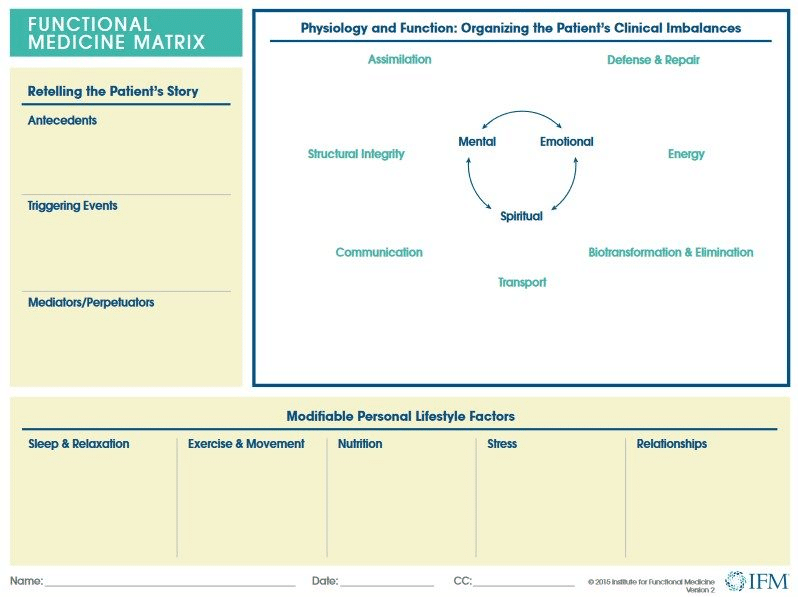Making healthy lifestyle changes can be overwhelming, but no one has to do it alone. A health coach is a guide and champion who uses the latest evidence-based techniques to bridge the gap between what clients know they should to do to be healthy, and the intrinsic motivation they need to actually make those changes (and then stick with them).
Functional Medicine Health Coaches Make Healthy Lifestyle Changes Possible!
What Is Health Coaching?
Health coaching is a collaborative process between a health coach and client aiming to improve overall health and well-being through sustainable lifestyle changes.

A health coach is a trained and certified health and wellness professional who guides clients along their health journey. They help clients get “unstuck” and coach them toward reaching their goals. Health coaches utilize evidence-based strategies to empower clients to make changes, activate internal strengths, utilize resources, and foster healthy lifestyle changes.
When working with a new client, a health coach listens and asks questions to help identify goals, barriers, and sources of motivation. As the client works to make changes, their health coach helps them tap into their innate strengths, using evidence-based strategies to empower clients to take ownership of their own change. They celebrate each win and provide support through each challenge, collaborating to solve problems and utilizing a wide range of resources to guide their clients to a healthier lifestyle.
Functional Medicine Health Coaches use functional medicine principles & positive psychology coaching techniques to:
- Educate clients and help them understand their doctor’s plan of care
- Offer tools and accountability when clients implement new lifestyle changes
- Motivate clients using positive psychology techniques
- Guide clients through dietary changes or prescribed food plans
- Support clients seeking to incorporate movement and exercise into their daily routines
- Inform clients of ways to improve sleep quality, manage stress, and cultivate mindfulness
- Help clients identify opportunities to nurture their mental, emotional, and spiritual health
- Work directly with the client’s practitioner when appropriate
- Offer resources on chronic illness management and lifestyle changes
- Celebrate successes and encourage progress
- And more
While health coaches provide support, guidance, and motivation, they do not replace medical care from a medical professional. Health coaches do not diagnose medical conditions or prescribe treatments. Instead, they act as supportive partners in facilitating positive changes for individuals’ overall well-being.
How Does Health Coaching Work?
As behavior change experts, health coaches know that the client must be invested in their own change and motivated to hit their goals—because if the coach is the only one driving the process, then any progress made is not going to last.
That’s what the Coach Approach is all about; uncovering the client’s motivation, leveraging their innate strengths, and empowering them to own the process, providing support and encouragement along the way.
The Coach Approach works because it makes coaching a collaborative, client-led process. Rather than giving direction, coaches partner with their clients to come up with realistic plans to reach the client’s goals and then maintain that success over time. Health coaches are guides who help facilitate change, using positive psychology tools like motivational interviewing and character strengths to overcome the Intention-Behavior Gap—the gap between the client’s goal and the day-to-day actions and habits that move them closer to that goal.
Here’s an example:
The Expert Approach
- You aren’t good at giving presentations at work.
- Your boss tells you to get better at presenting or there will be consequences. You feel stressed and intimidated, unsure where to start.
- Your boss sends you an article with tips from a well-known public speaker. For a few weeks, you try to implement the tips, but you aren’t motivated. You give up.
- You give your next presentation and haven’t improved, and you feel bad about it. You and your boss are both frustrated that nothing has changed.
The Coach Approach
- You aren’t good at giving presentations at work.
- Your boss asks you how you feel about presenting and listens to your POV. You feel heard. Together, you identify one thing that you could realistically improve before your next presentation.
- You and your boss make a plan for you to achieve your goal, and you spend a few weeks working on this plan.
- You give your next presentation and successfully meet the goal you set with your boss. Together, you celebrate this win, identify your next goal, and start working toward it.
In this live health coaching demo, Functional Medicine Certified Health Coach (FMCHC) Holly Ladd coaches a busy father of 3 with a family history of cardiovascular disease looking to make lifestyle changes to better adhere to his doctor’s recommendations of a Mediterranean diet and consistent exercise.
Follow along as Holly demonstrates the subtle power of The Coach Approach.
Watch Functional Medicine Health Coaching in action!
Who Needs a Health Coach?
No matter your age or health status, health issues are stressful and changes can be hard to make. Health coaches are a powerful wellness ally, working with clients to navigate the complexity of illness and manage the impact of symptoms on their quality of life. Coaches are especially valuable partners for those managing non-communicable chronic illnesses—inflammatory conditions like Crohn’s disease and ulcerative colitis, cognitive conditions like Alzheimer’s disease and dementia, metabolic disorders like diabetes, and other chronic conditions.
Adopting prescribed food plans, releasing habits that no longer serve you, adjusting to new routines, and navigating the healthcare system in search of a diagnosis are just some of the situations where health coaches can make a positive impact.
Clients don’t even have to be “unhealthy” to work with a health coach—their skills make them perfectly suited to support anyone who’s working toward a health goal. For example:
- A marathoner looking to stay on track with their training regimen
- A business owner who wants to manage their stressors more effectively
- A parent eager to introduce a healthier lifestyle to their kids
- Anyone interested in health aging and longevity goals
Health coaching is for anyone who cares about health and wants the benefit of a behavior change expert’s support as they make a shift in their lifestyle.
Why Work With a Health Coach?
When it comes to making healthy lifestyle changes, health coaches can be the difference between failure and long-lasting success. They make positive change accessible in these key ways:
Benefits of Health Coaching:
- Personalized Guidance: Health coaches use a client-centered approach, working collaboratively with clients to ensure they actively participate in setting their health goals, making decisions, and engaging in the learning process—which enhances the likelihood of successful behavior change.
- Behavior Change Support: Health coaches specialize in behavior change strategies, helping clients overcome obstacles and adopt healthier habits in accessible, realistic ways. This support is crucial for individuals aiming to make lifestyle changes they’ll actually stick with, long-term.
- Accountability: Clients are encouraged to monitor their progress and stay committed to their health objectives, fostering a sense of responsibility for their well-being.
- Motivation and Empowerment: Health coaches serve as motivators, empowering clients to take charge of their health. They help individuals tap into their internal strengths and external resources, fostering a sense of self-efficacy and motivation.
- Holistic Approach: Health coaching often takes a holistic approach, addressing various aspects of well-being, including nutrition, physical activity, stress management, sleep, and interpersonal relationships.
- Improved Well-being: Individuals working with health coaches often report improvements in overall well-being. This can include enhanced energy levels, better resiliency against stress, improved mood, and a greater sense of life satisfaction.
- Preventive Health Measures: Health coaching emphasizes preventive health measures, helping individuals identify and address potential health risks before they escalate. This proactive approach contributes to long-term health maintenance.
Is Health Coaching Effective?
Research shows that health coaching is effective for addressing a wide variety of conditions and health goals, including but not limited to:
In one study, spending as little as three months working with a coach led to measurable outcomes across a wide range of health issues and goals, including:
- Behavior changes like implementing a new exercise regimen, adopting a new food plan, or quitting smoking
- Improvements in blood pressure, cholesterol, body weight, and waist circumference, and other biometric risk factors
- Cardiac health and rehabilitation
- And, all these findings were consistent whether the coaching was conducted in person, over the phone, or via Internet video
Learn about FMCA and IFM’s recently published study here.
FMCA Founder Dr. Sandra Scheinbaum discussed a few recent studies on the effectiveness of health coaching on her podcast, Health Coach Talk. Listen below to gain her professional insight into what these studies mean for the future of health coaching.
Ready to work with a health coach?
For Clients: Browse our Find a Coach database of FMCA graduates.
Healthcare Providers: Discover how to work with a health coach.
Where Do Health Coaches Work?
Health coaching careers are varied and diverse, allowing each coach to tailor their work to their specific goals, interests, skills, and passions. A common path for many health coaches is to open their own practice or start a coaching-related business. They might coach clients in person or virtually, lead group coaching sessions, educate and give talks, design online courses, or carve out their own unique niches within their communities.
Learn More About the Business of Coaching:
- Building a Thriving Health Coaching Business, with FMCA Alum Hally Brooke
- How to Launch Your Health Coaching Business, with Hailey Rowe
- Shifting Your Mindset To Grow A Practice, With Robert Notter
Health coaches can also leverage their skills working for companies across various industries. This includes hospitals, health clinics, insurance providers, and mental healthcare providers, but opportunities are not limited to healthcare. Major businesses are hiring health coaches as part of their corporate wellness programs to improve employee health. Health and wellness apps hire health coaches for their expertise in behavior change. Even retail locations like pharmacies and grocery stores are looking for health coaches to offer their coaching services to customers as part of a more holistic and preventative approach to healthcare.
- Private coaching practices
- Hospitals
- Functional medicine practices
- Conventional medical clinics and doctors’ offices
- Mental healthcare providers
- Insurance companies
- Corporate wellness within larger businesses
- Restaurants and consumer product developers
- Schools and universities
- Gyms and fitness centers
- Public health organizations
- Pharmacies
- Large grocery stores and supercenters
One of the unique and appealing features of Health Coaching as a career is its flexibility—it can change to fit the needs of each individual coach. Health coaches may coach full-time or part-time, in combination with another career (like personal training, nursing, dietician, etc.) or on their own, in person or remotely, and in partnership with a healthcare practitioner or independently.
Interested in learning more? We wrote a complete career guide to answer the question, “How do health coaches make money?”
If you prefer to watch or listen to learn more, Dr. Sandi made the following video breaking down 26 career opportunities certified health coaches have.
How FMCA Students and Graduates Are Transforming Healthcare
Job Outlook for Health Coaches
The Global Health Coaching Market Report from AMA Research reports a compound annual growth rate (CAGR) of 8.9% for health coaching worldwide, and it predicts the market will grow to $28.57 billion by 2028. The demand for health coaching has increased, driven by rising chronic health conditions, and growing awareness of the value of health coaching to make healthy lifestyle changes.
Health coaching is a fast-growing career within the multi-billion dollar health and wellness industry. As of 2024, it’s a $7.6 billion service market with a strong growth outlook, according to the United States Health Coaching Market Report by Research and Markets.
An estimated 128,000 health coaches and health educators advise and motivate clients to change lifestyle habits and manage chronic conditions such as diabetes, and demand is predicted to keep increasing. While the US Bureau of Labor Statistics has not tracked health coaches specifically, similar careers’ employment rates are all growing faster than average, including health education specialists (7% growth), dietitians and nutritionists (7% growth), and fitness instructors (14% growth).
Where are new coaching opportunities expected to grow?
Locations include medical centers and physicians’ offices, corporations, day spas, wellness centers, and schools. Many of our alumni establish their own coaching practices or partner with practitioners, or sometimes both. Your options will depend on your background, interests, and what’s in your local area or accessible to you online.
As this is an emerging industry with its regulatory framework still developing, salaries for health coaches vary greatly. Some health coaches graduate from highly credentialed and respected programs, while others operate as “health coaches” without any formal training. Even among popular health coach certification programs worldwide, the quality of training varies greatly, which then shapes graduates’ performance and earning potential in the market. The US Bureau of Labor Statistics lists the median salary for a “health education specialist” as ~$63,000. Whether a coach can earn more or less than the median is influenced by a host of factors, including:
- The region in which the coach works
- Whether they partner with other providers or coach independently
- Any additional training and qualifications they hold
- Any niches or areas in which they specialize
- Whether they graduated from a credentialed program
- Whether they earn their National Board Certification from the National Board for Health and Wellness Coaching (NBHWC)
What Is a Health Coach’s Scope of Practice?
Health and wellness coaches guide individuals and groups in evidence-based, client-centered methods to help them develop sustainable behavior changes and achieve their health and wellness goals. They support clients through encouragement, exploration, mobilization of internal strengths, identification of external resources, and developing self-management strategies.

Coaches empower clients by leveraging their insight, strengths, and resources to set goals. They help clients commit to action steps and establish accountability for building a healthy lifestyle. It’s important to note that health coaches do not diagnose conditions, interpret lab work and medical data, prescribe treatments, recommend supplements, design or provide meal plans, offer exercise instructions, or provide psychological therapeutic interventions or treatment. Instead, health coaches support clients by offering education and crucial guidance to carry out prescribed treatment recommendations. By ensuring that clients understand the diagnosis and commit to the therapeutic plan, health coaches are key to health improvements. This is why increasing numbers of medical practitioners are partnering with health coaches. They know that collaboration with coaches ensures success for their patients and allows them to practice at the top of their licenses.
For more information about health coaching’s scope of practice, check out these resources:
- What is a Health Coach qualified to do?
- National Board of Health and Wellness Coaches: Scope of Practice
- Health Coaches and Lab Work with Monique Class
What Kinds of Resources Do Health Coaches Use With Clients?
In their role as guides, a health coach will often help their client find the tools and resources they need to overcome barriers and achieve their health goals. Resources a coach might share with their client include:
- Cookbooks and meal prep guides, like these recipes from FMCA
- Healthy swaps and shopping lists, like FMCA’s Guide to Picking and Storing Produce
- Food plan education, like IFM’s Core Food Plan Guide
- Relaxation and meditation exercises, apps, and tools, like Dr. Sandi’s Guide to Relaxation Through Breathing
- Online courses on particular health- and well-being-related topics, like the Intro to Creating Wellness free sample course
- YouTube channels and other social media accounts to follow
- Healthy lifestyle tips
- Anything else the coach discovers or creates to assist their clients’ health journeys
Should I Become a Health Coach?
If this sounds like you, you’d make a great health coach:
- Strong communication and interpersonal skills
- Curious, lifelong learner
- Great listener (Find out what kind of listener you are: Take the quiz here)
- Goal-oriented
- Empathetic and encouraging
- Reflective and mindful
- Find meaning in helping others
- Seek out the latest health information and enjoy sharing it with others
- Practice self-care and healthy boundaries
- Interested in food, cooking, and trying new things
- Motivated to find creative solutions
- Practice gratitude and celebrate wins
- Invested in fixing a broken healthcare system and believe a better standard of care is possible
- Self-starter with an entrepreneurial mindset who will forge their own path in a fast-growing field
These are some of the common traits shared by those who find health coaching to be a rewarding profession. If you’re feeling called to become a Health Coach, the next step is to pursue training and certification.
How Do I Get Certified as a Health Coach?
If you’re thinking about becoming a health coach, the first step on this transformative journey is enrolling in a training program to earn your certification.
There are two main types of certification in the health coaching industry: program certification and Board Certification.
Program Certification
- Credential certifying that you have completed a health coach training program
- Certified by: Your training program
- Title: “Health Coach;” additional titles vary program to program
Board Certification
- Credential certifying that you meet rigorous industry standards for Health Coaching
- Certified by: The National Board for Health & Wellness Coaching
- Title: National Board-Certified Health & Wellness Coach (NBCHWC)
The credential you hold can determine the types of coaching jobs that you are qualified for, the kinds of providers who will partner with you, the rate you can charge, etc.
Virtually every health coach training program offers program certification. If you think you’d like to sit for the Board Certification exam as well, make sure you choose a program that’s approved by the National Board for Health & Wellness Coaching (NBHWC). If your program is not approved by NBHWC, you cannot sit for the Board Certification exam.
NBHWC: What Is Board Certification for Health Coaches?
NBHWC collaborates with the National Board of Medical Examiners to set the standards for education and assessment in the health coaching field. They administer a robust Board Certification exam, and health coaches who have completed their training through a NBHWC-approved program may choose to sit for the exam. Those who pass the exam earn the title “National Board-Certified Health & Wellness Coach” (NBCHWC), and this credential has become the gold standard for health coaches.
A quality program—one that’s NBHWC-certified—will prepare you to sit for the Board Certification exam in a few ways. They’ll ensure you receive a thorough grounding in core concepts like coaching skills, healthy lifestyle fundamentals, nutrition, digestion, and hormones. They’ll build in ample hands-on time to practice your coaching skills and receive feedback on your technique. A quality program will also share their “passing rate” (the percentage of prior graduates who were able to successfully earn their NBCHWC credential). A program’s high passing rate demonstrates that their graduates have adequate preparation to pass the exam. FMCA’s passing rate has been as high as 95%—well over the national average
Why Functional Medicine Health Coaching?
Some health coaches focus on weight loss, specific condition management, or taking recommendations from their client’s conventional doctor and implementing them. While this type of coaching certainly can be effective, it can also be quite limited in scope.
No health condition exists in isolation—our bodies are interconnected systems impacted by genetic, behavioral, historical, and environmental factors. It’s disjointed and limiting to coach from a symptom resolution perspective, rather than a root-cause-focused one.
This conventional approach to coaching repeats the same dysfunction that plagues the broader healthcare system. It’s reactive rather than proactive, chasing downstream symptoms rather than looking upstream for a root cause. It’s one-size fits-all, when it could be individualized. It’s inefficient, when it could be cost-effective.
Each client is like a whole book. Why read only one chapter and think you know the story? Why take such a narrow viewpoint, when a better way exists?
That better way is functional medicine health coaching.
Functional Medicine health coaching is a coach approach that unlocks powerful healthy lifestyle changes by taking the entire person into account, identifying the root causes of health issues, and then facilitating individualized, patient-centered changes that the client can actually maintain.
What is functional medicine, exactly? It’s a wellness-based approach that is holistic and proactive. It focuses on addressing and resolving the root causes of illness, not just prescribing treatments to address the symptoms. Functional medicine uses tools like the Functional Medicine Matrix to capture a whole-person picture of health, including body systems, triggering events, family history, and daily habits—all the factors that shape our health, far beyond the latest symptoms.

Learn more about Functional Medicine here.
FMCA trains our students to combine functional medicine and health coaching because we believe that an integrative, whole-person approach to healthy lifestyle change is the best way to serve clients and transform healthcare.
The title that FMCA graduates earn—“Functional Medicine Certified Health Coach” (FMCHC)—reflects their specialized training. They graduate with a solid foundation in the healthy lifestyle fundamentals found on the NBHWC Board Certification exam and in the average hospital or doctor’s office. However, much of their training focuses on functional medicine and integrative nutrition principles, enabling them to work closely with functional medicine doctors and other integrative practitioners.
FMCHCs are transforming healthcare because they bring their root-cause, holistic perspective with them wherever they go—whether that’s partnering with holistic providers, conventional ones, or directly with their own clients.
By combining these two incredible healing modalities, Functional Medicine Certified Health Coaches (FMCHCs) are uniquely capable of connecting with their clients and making them feel seen and heard. They listen, trusting and believing that their client is the expert on their history and experiences. Together, they collaborate to build a holistic plan of action that incorporates the complexity of the client’s health needs and everyday reality. They tap into functional medicine principles and tools to achieve optimal outcomes that serve the client in every aspect of their life.
Functional Medicine Certified Health Coaches are transformative changemakers who know the underlying drivers of wellness and the behavior change techniques that create healthy shifts. They’re skilled collaborators and partners to functional medicine practitioners, conventional doctors, and clients alike. Their ability to see the big picture and then translate what they see into small steps that facilitate change is what makes them so powerful and effective. This approach is the key to a healthcare system that prioritizes true health, not just symptom resolution. By embracing the comprehensive and integrative methods of FMCHCs, we can foster a healthcare environment that genuinely nurtures and sustains wellness for all.






